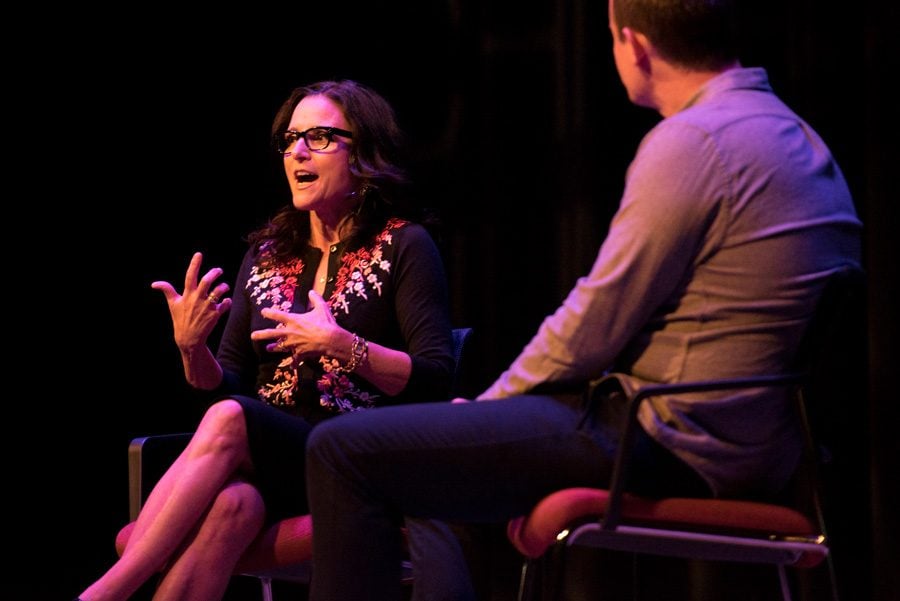Julia Louis-Dreyfus talks about ‘SNL,’ ‘Veep’ at Chicago Humanities Festival Event
Wilson Chapman/Daily Senior Staffer
Julia Louis-Dreyfus speaks at Chicago Humanities Festival. The Northwestern alumna has won eight acting Emmys for her work on acclaimed sitcoms such as “Seinfeld” and “Veep.”
October 27, 2019
During her junior year at Northwestern, Julia Louis-Dreyfus performed in the Mee-Ow show. After the final performance, a producer from “Saturday Night Live” came up to her and a few of her co-stars and asked them if they wanted to be in the next season of the show. Her response?
“Uh, yeah!”
Louis-Dreyfus spoke about her time at Northwestern at Cahn Auditorium on Sunday to a sold-out house. The Chicago Humanities Festival hosted the event for its 30th anniversary celebration.
Louis-Dreyfus’ talk was part of the festival’s Elaine and Roger Haydock Humor Series, which interviews comedians about their careers. The actress is an eleven-time Emmy award winner, receiving wide acclaim for her roles in “Seinfeld,” “The New Adventures of Old Christine” and “Veep.”
“Julia Louis-Dreyfus is an actor who has filled her post-Northwestern career with truly iconic performances, memorable roles and literally decades of experience in both television and film,” Bill Melamed, managing director of development at the Chicago Humanities Festival and a friend of Louis-Dreyfus, said in his opening remarks at the event.
Onstage, Louis-Dreyfus joined indie director Joe Swanberg, who is best known for his film “Drinking Buddies.” Swanberg asked the actor questions taken from an audience survey from before the show.
Louis-Dreyfus talked about her time at “SNL” and the challenges she faced there. When she left school to perform at “SNL,” she arrived excited, having been a lifetime fan of the show. However, she said she was completely unprepared for the combative and sexist culture and was absolutely miserable during her short tenure of three seasons.
As hard the experience was, Louis-Dreyfus said it was an important one for her, as she learned valuable acting lessons from putting on a live show every week. She compared it to grad school, saying that in her three years there, she received a crash course about how to be an actress.
She also found opportunities and made connections through SNL — during her last season, comedian Larry David also worked there, and the two bonded over how much they hated the environment. Four years later, she ended up working with David in her star-making role as Elaine on “Seinfeld.” When she left “SNL,” she was determined to only take acting jobs that were fun and had a healthy environment.
“That was a huge lightbulb moment for me, and it’s been hugely helpful for me going forward,” Louis-Dreyfus said. “I call it the ‘no assholes’ policy.”
Years later, Louis-Dreyfus would return to SNL in 2006 as the first female cast member to serve as host. She said then she was able to take charge and have the experience she wanted during her original run on the show, thanks to how much she had grown as an actor and a person in the years since.
Louis-Dreyfus and Swanberg also discussed her latest role as Selina Meyer in “Veep.” Swanberg asked Louis-Dreyfus about her process researching and working on the show, which follows the career of a disgruntled vice-president, noting that many politicians have described it as the most accurate portrayal of politics on television.
“Everything I’ve read from politicians says that ‘Veep’ gets it more right than anything else,” Swanberg said. “(Politics are) really that confusing, and power is shifting in these nebulous ways. It’s amazing and frightening to me.”
Louis-Dreyfus said before the show started, she and the cast and crew took several trips to Washington, D.C., where they talked with both notable politicians like former vice president Al Gore and behind-the-scenes people who helped inform the tone of the show. Louis-Dreyfus said one of the factors that made “Veep” work is that the show was careful not to identify the parties of any of the characters, focusing instead on the bureaucratic elements of politics, which helped attract people from both sides of the aisle.
When Swanberg asked her what attracted her to comedy, Louis-Dreyfus admitted she did not know she wanted to be a comedic actress, but gravitated to it when she kept getting parts in comedies at Northwestern.
Louis-Dreyfus attributed her skills as a comedian, and her views toward comedy, to her background, noting that she comes from a family that values comedy, and has used comedy to cope with the tragedy in their lives.
“There’s something about dark humor in particular that really makes me delight,” Louis-Dreyfus said. “And it’s gotten a lot of people I know through hard times. I recall my father saying something like, ‘Without a sense of humor, you’re dead.’ And I sort of subscribe to that thinking. It’s a lovely thing to laugh, particularly in the face of something that’s really not funny.”
Email: [email protected]
Twitter: @wilsonchapman6


